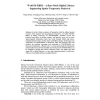Free Online Productivity Tools
i2Speak
i2Symbol
i2OCR
iTex2Img
iWeb2Print
iWeb2Shot
i2Type
iPdf2Split
iPdf2Merge
i2Bopomofo
i2Arabic
i2Style
i2Image
i2PDF
iLatex2Rtf
Sci2ools
150
click to vote
ICADL
2004
Springer
2004
Springer
WebGIS-RBDL - A Rare Book Digital Library Supporting Spatio-Temporary Retrieval
In order to help researchers of humanities study the cultural ancient resources from temporal and geographical perspectives, we build WebGISRBDL at Peking University. In WebGIS-RBDL, metadata records and historical map layers are linked together, and therefore users can get more spatio-temporal information about rare books through folded map layers, including historical maps, modern maps and landform images. In this paper, the architecture of WebGIS-RBDL is introduced. Then, the principles, rules and methods for metadata extracting and correlating in WebGIS-RBDL are discussed. Furthermore, efficient tools to extract spatio-temporal information automatically from rare-book metadata are developed. The WebGIS-RBDL can be extended to include other ancient collections easily. Our efforts show that using GIS in digital libraries is a new and promising method to build more effective user-friendly interfaces in digital libraries.
| Added | 01 Jul 2010 |
| Updated | 01 Jul 2010 |
| Type | Conference |
| Year | 2004 |
| Where | ICADL |
| Authors | Ming Zhang, Dongqing Yang, Zhi-Hong Deng, Sai Wu, Feng Li, Shiwei Tang |
Comments (0)

